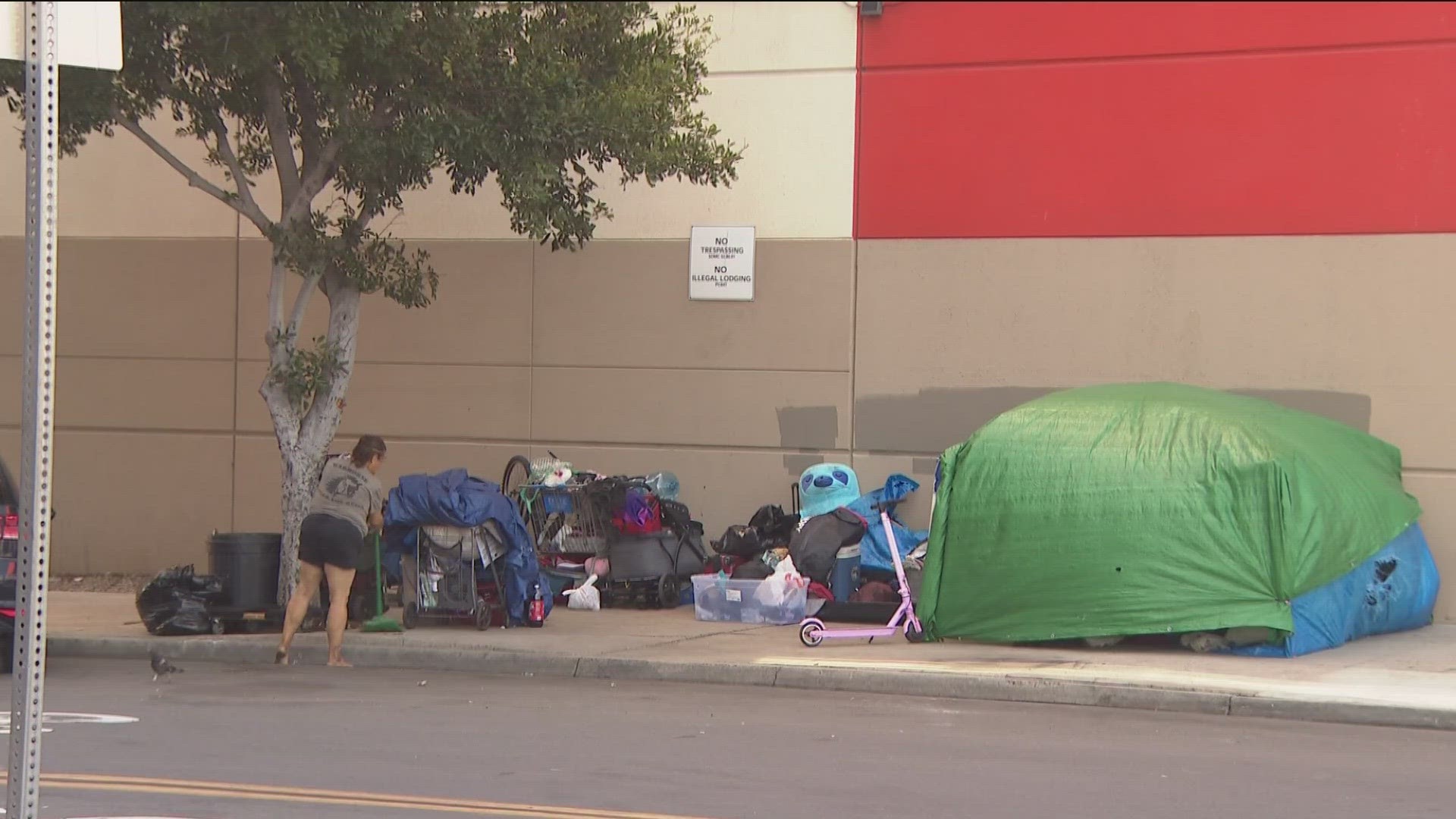SAN DIEGO — The county Board of Supervisors voted 4-0 Tuesday in favor of drafting an unsafe camping ordinance similar to ones recently passed in the cities of San Diego and Poway in an effort to curb homeless encampments.
Supervisor Joel Anderson said the ordinance is necessary to handle the ongoing homelessness crisis, and also stressed that it could help reduce wildfire risks.
Supervisors directed the chief administrative officer to draft an ordinance that "would allow law enforcement to prohibit and abate illegal encampments, remove improperly stored property on public property, and protect vacant property, such as the San Diego River corridor, from fire and pollution," according to information on Tuesday's agenda.
There is no timeline specified in drafting the ordinance, which will be presented to the board for review and possible revisions during a future meeting, according to Anderson's office.
Anderson's proposal also included "asking for support for direction to county staff to identify potential properties that could serve as regional homeless shelter solutions to help ensure the availability of shelter space to move those living in encampments and connect them with wrap around services and a path to permanent housing."
However, with a shortage of shelter beds and resources for the unhoused in the county, it was unclear where people could go in the interim between a proposed ban and the eventual securing of enough beds for every homeless individual.
"Although the county and its partners successfully cleared encampments such as the North Magnolia Avenue site in unincorporated El Cajon, the county enactment of an unsafe camping ordinance will provide another tool to help clean up similar encampments on a wider scale throughout the county's unincorporated communities," Anderson wrote in a letter to the board.
During Tuesday's meeting, Anderson said he doesn't wish to criminalize homeless people. He touted the county's previous efforts to help people get off the streets, including the purchase of small homes, but added that shelters should be a first option.
With Wednesday marking the 20th anniversary of the deadly Cedar Fire in San Diego County, Anderson said it was important to ensure that safety rules are in place, adding that the county responded to over 100 reported fires last year.
"If you put yourself in harm's way ... we can prohibit that," Anderson said. "I'm done with the status quo -- I want to see change."
Board Vice Chair Terra Lawson-Remer and Chairwoman Nora Vargas advocated for a policy that doesn't do further harm to those on the streets. "Let's do this ordinance in a humanitarian way," Vargas said.
Lawson-Remer called it immoral that people sleep on streets in the world's wealthiest nation. She added that the board's decision "would just be the very beginning of the beginning" as "the county does not work like the city."
Supervisor Jim Desmond said the ordinance won't be a panacea, but since county homeless numbers have increased by 22%, it was time to do something different. He added it was important to strike a balance, so residents can take back their streets and sidewalks.
During an hour-long public comment period, most speakers were opposed to any new ordinance. Erin Grassi of Alliance San Diego said the proposal is the most expensive and least effective way to end homelessness, makes it harder to access vital services and running counter to a "housing first" policy.
She said the county could also lose funding from the U.S. Department of Housing and Urban Development. "We are watching, and we will remember who stood up today for human rights and who does not," she added.
San Diego resident Giorgio Kirylo was in support of the camping ban, which he described as a stop-gap measure focusing on security. "The reality is that we have to try and do something," he said.
The city of San Diego's camping ban isn't being handled it as well as it could be due to a lack police officers, Kirylo said, adding, "We want a solution, we want to save lives."
On June 13, the San Diego City Council approved a measure that prohibits tent encampments in all public spaces throughout the city if shelter beds are available. It also bans tent encampments at all times in certain sensitive areas -- parks, canyons and near schools, transit stations and homeless shelters -- regardless of shelter capacity.
The council passed the controversial ordinance 5-4, with Mayor Todd Gloria and Councilman Stephen Whitburn being strong advocates. Critics say it criminalizes homelessness and won't solve the overall problem.
Those who voted no on the ordinance were council President Sean Elo- Rivera and his colleagues Kent Lee, Monica Montgomery Steppe and Vivian Moreno.
Poway approved its ordinance in July, "allowing law enforcement to abate illegal encampments and remove improperly stored property."
Santee made it illegal to have an ignition source in the San Diego River corridor and the cities of Encinitas, El Cajon and Chula Vista City Council are considering similar bans.
In September, 1,930 people experiencing homelessness requested a shelter bed for the night, and all but 393 were turned away, according to the San Diego Housing Commission.
The number of people entering homelessness in the region has outpaced those finding permanent shelter for more than a year. According to the Regional Task Force on Homelessness monthly reports, in September, 1,195 people in the region became homeless for the first time, while 776 people found housing.

